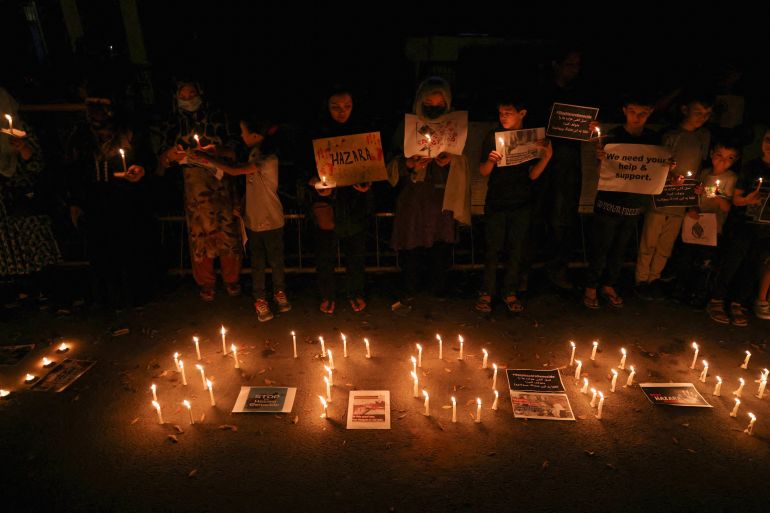As an Afghan Shia father, I fear for my children
Sectarian violence in Afghanistan is showing no sign of abating but our spirit has not been broken.

I was 17 years old when I lost a friend to anti-Shia violence for the first time. In 2004, I was in the Pakistani city of Quetta, studying English, when one day one of my classmates, Emran, a 13-year-old boy who sat next to me, did not come to class. We later learned that he had been killed in a suicide bombing, targeting a religious procession during Ashura, the day when Shia Muslims commemorate the death of Hussein ibn Ali, the grandson of Prophet Muhammad.
After that tragic day, whenever I turned to the left to whisper something to Emran, I would see an empty seat and feel a painful lump in my throat.
It was the first time I became aware of anti-Shia violence. My country, Afghanistan, had seen quite a lot of violence, but the stories I heard from my parents were about the Soviet occupation and some incidents in the 1990s under the Taliban. So I had grown up not completely aware of the ethnic and religious hatred some in our region felt towards us, Shia Muslims.
Emran’s death shook me. I kept asking myself, who wanted to kill a boy who always tried to get As in class and was always nice to his classmates? Who wished for the death of a boy who never hurt anyone?
After that bombing, attacks on Hazaras and Shia Muslims in Pakistan escalated. I came back to Afghanistan in 2006, hoping I was going to leave behind this horror. I prayed sectarian violence would not reach us. But it did.
In December 2011, a suicide bomber targeted Abul Fazl Shrine, in Kabul where Shia Muslims had gathered for Ashura. Some 80 people were killed and many were wounded in the explosion.
In the following decade, Shia children, women and men fell victim to sectarian violence in mosques, schools, stadiums, buses, bazaars, etc. This cycle of violence continues unabated to this day, as religious radicals persist in their attacks on ethnic and religious groups.
Throughout these years, many of us have lost family and friends to anti-Shia violence. There are hardly any Shia families that have not been affected by this endless killing of innocent people.
Today, I am the father of two children. I recall losing Emran 18 years ago and I fear that my children will also go through this trauma. Worse still, I dread that that empty seat in class may be theirs.
When I heard of the suicide attack on Kaj Educational Center in Dasht-e-Barchi neighbourhood of Kabul in late September, my heart sank. Some 53 students, mostly young women, were killed and more than 100 wounded. While for the rest of the world this was yet another bombing killing another handful of faceless, nameless Afghans, for us, this was another horror to grapple with.
While the rest of the world was quick to move on from the news, we are still reeling from the loss of so many young, bright people, who were studying to become teachers and hoped to work for the betterment of their community and their country. Their lives were taken for daring to pursue education, for daring to dream.
When I heard of the bombing, I thought of my elder daughter. She is now in first grade, studying hard and dreaming big. As a father, I put all my energy and effort into providing the best for her, I put her needs before mine. I help her with her homework and make sure she goes to a good school.
She knows about bombings, but I try my best to keep her in the dark about attacks on schools. She and her classmates have been given training on how to escape in case of an attack, so she is aware it can happen. But I keep telling her that her school will not be targeted and she believes me.
Sometimes she asks, why has God created bad people? A question that is hard to answer. In response, I simply shrug and say, maybe God created them to be good people but they turned bad. Perhaps they did not go to school and turned into bad people.
What I cannot tell her is that the principal of her school told me and other parents that he cannot guarantee the safety of our children.
It burns me inside to know that I can work hard to provide for her and her younger sister, to make sure they are educated, that they are able to pursue their dreams, but I cannot fully protect them from those who hate them for being Shia Muslims.
There are many Shia fathers and mothers like me. Many fear that they won’t see their children grow up to be the doctors, teachers, engineers, lawyers, etc they want to be. We have called on the government to protect us, but they have turned a blind eye to the violence. We have called on the international community to do something, but our calls have been ignored.
Many from the community have chosen to leave Afghanistan in order to search for a safe place to raise their children.
But many of us have also decided to stay and persevere. In the face of escalating violence, we, as a community, will never give up practising our religion and pursuing education. We who remain have learned to find hope in the small things.
The day after the deadly suicide attacks in Dasht-e-Barchi, I sent my little daughter to school. As I walked the streets in Kabul, I saw other groups of students. It was clear our spirit had not been broken.
The views expressed in this article are the author’s own and do not necessarily reflect Al Jazeera’s editorial stance.
